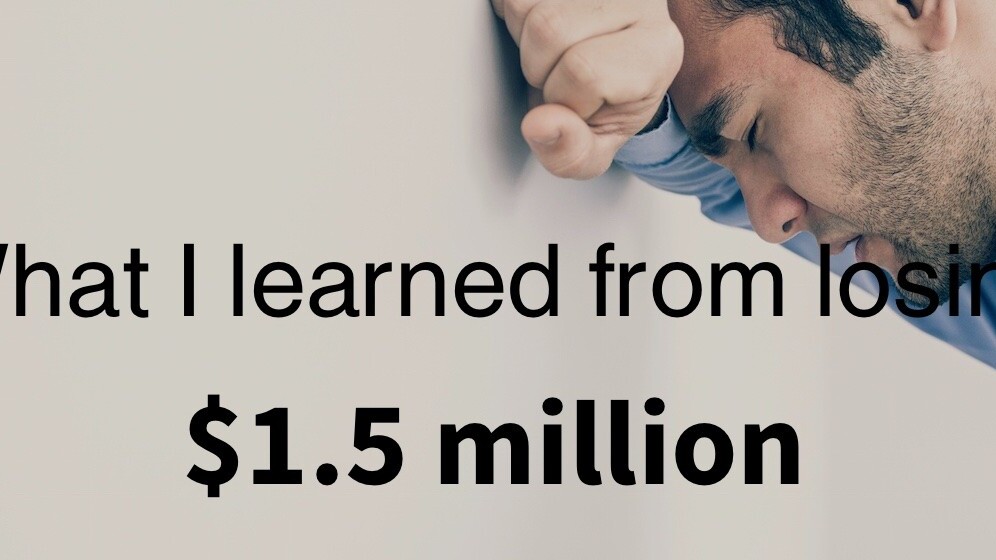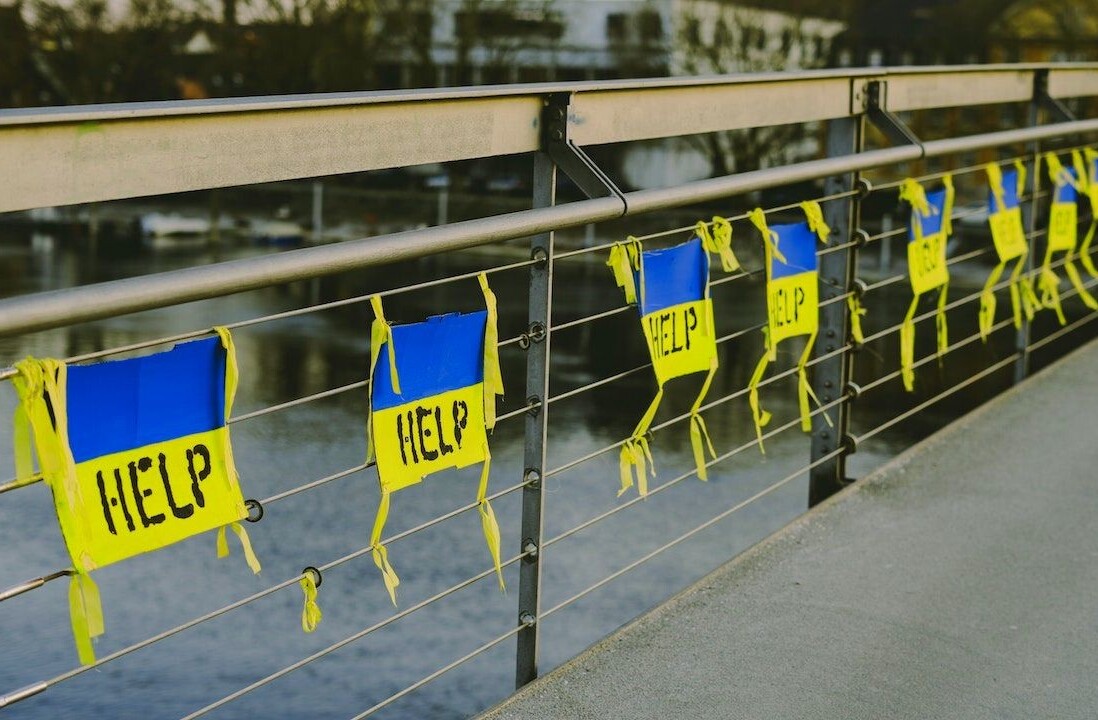
Vitaliy Rizhkov is the founder of Finic, which helps turn your memories into art. He is running the startup with 100 percent transparency sharing every little detail such as all financials, salaries, hiring, firing, successes and failures on his blog StartupLabs. This post first appeared in Russian on SiliconRus.
I started with nothing. I had absolutely no experience with online business. All I knew was that there were a lot of people making good money through online businesses. I wanted to do the same. I had nobody I could ask for advice.
When the 2008 financial crisis hit Canada I was involved in building and selling real estate. Earlier that year a business partner and I managed to build five houses valued at $1m+ each. We had two houses out on the market when the crisis hit. We had built up a good business thus far and it was shocking to see the payments on all our loans grind to a halt. As you probably remember nobody was lending or borrowing at this time. We had no choice but to declare bankruptcy.
This is when I decided I wanted to build an online business. My first startup idea was to build an ecommerce store which would sell phone accessories such as chargers, cases, batteries, etc. I hustled hard, signed a contract with Garmin rather quickly and we sold a few hundred GPS units through our newly built site. I was crazy excited, this was a very promising start to my very first online business.
It took me close to a year to realize that the phone accessories market was an extremely crowded space and it was very hard to build a profitable business since competition was insanely fierce. My margins were shrinking as my business was eaten by competition. I decided to shut it down.
My next endeavor was an affiliate marketing business which showed legs right away. The idea of affiliate marketing is very simple: use ads or another source to bring traffic to a website selling a product and take a percentage of the sale when it happens.
In my case I started experimenting with ads driving affiliate traffic to product pages and collecting revenue off the sales. It worked quite well. I started making a salary I could survive on right away. It was important for me at the time to be able to make ends meet and have some good income. The more I worked on this the more profitable this business became. It was just me at the time.
Desire to Build a ‘Real Startup’
Affiliate marketing which I did on the side earned good money for me but I wasn’t very passionate about it. The trouble is that it wasn’t a real product, it was just a quick and easy way to make cash. I wanted to build products, apps, tools, websites.
I had an idea for a new startup at the time and I was very excited about it. Facebook + Amazon ecommerce marketplace based on recommendations from your connections. Your friends who recommend products would get a kickback if you bought something they recommended. Friends could only recommend products they actually bought.
I had a permanently ingrained goal in my mind: become the next Zuckerberg. I told myself I could totally do this if I just give my idea all I got. I named my startup Idooble and started searching for freelance developers to build an MVP.
It took me just a week to find a small outsourced development firm from Minsk, Belarus. I had a Skype call with them and they seemed to have a good track record, they were sharp and experienced. They quoted a price of $5,000 to develop an entire MVP for Idooble in three months.
It sounded perfect to me. I was pumped. Good price and a great timeline. I could continue doing my affiliate marketing on the side to earn more cash and bootstrap as I fund the development of my startup. We started development immediately.
I had to borrow $600K from friends
Six months passed. The development of Idooble was not finished. The quote of $5K had increased to $20K. My affiliate marketing on the side was still going well and I was putting more money into my startup.
A little after six months into development the firm let me know that they would not be able to finish the project. I was completely shocked.
I bought a ticket and flew to Minsk where I struck a deal and hired two of their developers to join my new startup, these two developers were my first real employees. I registered a new entity in Belarus to employ my first employees and the three of us continued building the product on our own.
Time difference became a bit of an issue right away, we had a hard time communicating. I started flying to Minsk every month for about a week to make sure all of us were on the same page regarding product roadmap. My affiliate marketing business was doing incredibly well on it’s own and so I could invest more money which I earned from it into Idooble.

It took a year and much more than $5K to build the MVP of the product, during this year our startup grew from two to 12 people. At the end of the first year when the MVP was finally complete I was out of cash and needed a significant investment to keep the business going. The revenue I was earning on the side from my affiliate marketing business could not fund our burn rate at Idooble anymore.
I turned to friends. I took a $300,000 loan from a friend in Moscow and shortly after another loan of $300,000 from a friend in Toronto. I borrowed a total of $600,000 from friends.
Since the MVP was finished and we now had $600,000 in the bank (which I borrowed) we felt really good and launched Idooble to the public. In the two months following the launch we acquired 20,000+ users. I had a really good feeling, we had a lot of customers and seemed to be growing fast. Success seemed right around the corner.
Shutting the site down on 40,000 customers
I was sitting across from Sergei Burkov at a cafe in Palo Alto, CA. Sergei played a major role in establishing Google.ru and is an experienced entrepreneur, investor and advisor to many startups.
“Close the shop. You will not be able to grow this business.” he told me. I met Sergei through my search for a mentor and at first he really loved the idea of Idooble and the traction we were able to establish. As we talked more and more about the business and finances he changed his mind.
He pointed out that I needed a significant amount of capital to scale this business further. Thinking back on it I don’t think we could have easily scale it even with a large investment. We lacked experience in scaling these types of products and services. We had no idea what we were doing, we were simply running, we needed guidance, structure and a LOT of advice.
I was having a lot of trouble finding people with expertise I needed to join our team and I needed a lot more capital since I was running out of money once again. I did not want to keep borrowing more money as I searched for experienced business folks to help us scale.
I took Sergei’s advice. Next morning after our meeting with Sergei I shut down our startup. We took the site down and notified everyone that we are closing down. We had 40,000 users - all of them gone. Crazy, I know but I saw no other way out at the time.
This was my first ‘real startup’.
Growing to $500K/mo revenue in 3 months
As soon as we shut down Idooble my side affiliate marketing gig became our fulltime focus. I moved my entire team from Idooble over to my affiliate marketing company. In a matter of a few days I suddenly had a team of twelve people doing what I used to do on my own as a side project. We started making some serious cash almost immediately.
In the three months which followed the shut down of Idooble our affiliate marketing business revenue went from $100,000/mo to $500,000/mo. Our net income from $500,000 was $100,000. Once again the numbers looked real good, this time it was not just a lot of customers it was actual revenue we were earning!
There was one big ‘but’: I hated the world of affiliate marketing and I was constantly trying to move away from it. It was a quick and sometimes slimy way to make money but it was not a real product which solved a real need for people.
I got very little satisfaction from working on it since money was never a big priority for me personally, my priority had always been to work on something I loved.
Growing from $500K/mo to $1M/mo revenue
Money is money though and we had a very profitable business so I wasn’t planning on closing it down. I wanted to build products and tools to help address real needs in the market rather than running affiliate marketing.
I asked myself: are there products which I could build which would in the short-term benefit our business and in long term could become separate startups? The answer was ‘yes’.
Our business really needed some marketing tools to help us become more efficient but since this was 2012 there just weren’t that many tools out there addressing our needs. I saw an opportunity.
I decided to split the affiliate marketing business into two separate entities: half of our team would continue working on affiliate marketing business which was doing really well and the other half would build marketing tools to make ourselves more efficient.
Little did we know, the tools which we ended up building not only made us more efficient but made us a lot more money. We built the following tools to grow our business from $500,000/mo revenue to $1m/month:
• Clicketta - a tool we built to monetize exits from a website. In affiliate marketing we had a lot of people who click over to a product page but do not actually buy the product on that page. As a result we would not get paid any affiliate dollars. We had a lot of exit traffic and this tool monetized this exit traffic by showing these web visitors an offer as they were exiting a website. This tool alone added $2,000 per day of revenue for our company.
• Agentera - a chat client we built for simple chat support with our website visitors. Back in 2012 there weren’t many tools which did that. This tool alone improved conversion on our site by 10 percent.
• Weberra - a landing page tool which allowed us to quickly and seamlessly create hundreds of landing pages. Again there are hundreds of solutions for this now but back in 2012 it was a completely different story. We could now make hundreds of landing pages in seconds and this tripled our efficiency.
• Yosto - an affiliate marketing platform we built to semi-automate part of our process and allow us to attract more affiliate websites where we could advertise products. This helped us earn much more money from affiliate referrals since our inventory of affiliates grew so much faster.
• Lead Generation Offers - this was not a tool per se but more of a new service we started offering and trying to partially productize. We ran lead generation offers for a slew of different industries delivering high quality qualified leads for our customers. We advertised these lead offers on Google Adwords and would deliver leads directly to customers paying us.
Within the first year after I shut down Idooble and moved our entire team to focus on our affiliate marketing business we grew to $1m revenue per month. We had 35 people currently working on our team, we were rapidly growing and hiring fast.
I could smell success. The numbers did not lie, we were making great revenue and had a growing team. It seemed that my dream of becoming Zuckerburg was not that far off from reality.
Stress, Fatigue and Exhaustion
We started our second year of business with a boom: we moved into a new office and grew to 100 people by Q2. On paper everything seemed to be going in the right direction but something deep inside felt wrong.
I could not place it. Week-by-week passed, our revenues grew, yet I felt worse and worse about the business. I asked myself ‘why’ many times but could not figure it out. One day I finally got it. I was alone and beyond exhaustion. I was working 16-hour days and had completely failed at delegating tasks because I did not trust anyone on our team.
I couldn’t take vacation, I couldn’t take sick leave, I couldn’t leave the office at all. There was nobody whom I could trust. There was nobody who could take on my role for a short period of time. I was completely alone.
How did I get here? I had 35 people around me, but I couldn’t trust any of them?
I realized that when I began building our team in Belarus I failed to see that most of the outsourced software developers who I hired cared more about money than our mission and company. As a result, I could not trust them. I could not delegate.
I was also the only instigator in the company. All new ideas came from me and me alone. Nobody else cared. I was alone.
My work schedule took a hard toll on my family life as well. My constant absence from home added considerable stress to my life. Arguments with my wife, the guilt of not seeing my children growing up and constant pressure to push harder at work contributed to my distress.
I wanted out. I was unhappy. But I did not see how I could possibly quit. I desperately tried to build trust with people on my team to be able to delegate work. I needed to free up and stay sane. I was in desperate need of a normal work and life balance.
I was rapidly becoming stressed, exhausted and depressed.
I lost $1,500,000 and laid off 100 people
Our revenue at the time was about $500,000/mo with a burn rate of $350,000/mo and we had $1m in the bank. Any profit we made I kept in the bank for future needs. My personal bank account had nothing. I took a small salary from the company just to be able to cover rent and food.
Our main source of income came from one single vertical: personal loans. We generated traffic, converted that traffic into leads (people who wanted to borrow money) and sold those leads to lenders.
Everything was automated and worked really well, until one fine day, when a number of laws were passed by Congress which froze the accounts of half of our lenders (our customers who paid us most of our revenues). On that very day our revenues fell by 2X and our profit fell to zero.
We went from a profit of $150,000/mo to a negative $350,000/mo. We started burning $350,000/mo in a matter of minutes.
For the duration of the next three months we continued to burn $350,000/mo as we desperately tried to save the company.
At the end of the three months we had burned through $1m we had in the bank and I couldn’t pay my employees anymore. We decided to lay off my entire team of close to 100 people in Minsk. It was an extremely hard decision but I had no choice.
The process of closing down the office in Belarus took a few months. I owed a total of $440,000 for office rent and vacation pay to all my employees who I had just laid off. My lawyers insisted that I did not need to pay this amount and that I could just declare bankruptcy.
I decided that it wasn’t right. It was unjust and I could not burn bridges with my team. Both the company bank account and my personal bank account were close to zero. I took a personal loan for $250,000 to start paying off office rent and vacation pay to my former employees. I can say now, I never regretted doing so.
All in all, I lost $1,500,000 and had laid off 100 people.
I kept the company going after I laid off most of my employees. I kept six people from my initial team to continue running the company. There were other revenue sources in the company we started focusing on and with a smaller team we had a much lower burn rate.
We slowly nursed the company back to health over the next few months as we paid off the $400,000 in rent and vacation pay to former employees.
Bounced back and invested $2.4M into a new startup
I thought losing 100 employees and $1.5M while borrowing money to pay off my debt would put even more weight on my shoulders. It was quite the opposite.
I felt as though a huge rock was lifted off of my back. I suddenly had TONS more time to spend with my family.
We had six people left in the company all of who lived in US or Canada. It was MUCH easier to stay in contact with them and talk about our mission and where we were headed. I was no longer alone. I had people on my team now who actually instigated things.
We decided to focus on one specific vertical of affiliate marketing which showed the best potential to us at the time. We gradually began to bounce back and make good revenue once again.
We used everything we earned the first half of 2014 to pay back all the personal loans I had taken over the years. We had close to $900,000 worth of loans we owed to investors and personal friends who loaned us money to start our business. Yup, I know, it’s a big sum to borrow. By the end of 2014 we had paid off 100 percent of this amount.
The biggest win in my mind was the team of seven people who was left behind from my previous company and worked through 2014 to get our company back on track.
I finally had a team I could trust and delegate my responsibilities to. They instigated and initiated ideas in the company and ran with them. Their ideas (not mine) were paying off and earning revenue for the company. Instead of me it was my team who led the company now.
Since I was finally free from my day-to-day responsibilities and finances were in order I was itching to start a new business. I started Finic.com in early 2014. To date we have invested $2.4M into Finic from our affiliate marketing business (which is still doing very well).
I have been reading on transparency a lot recently and was inspired to make Finic as transparent as possible. I started a blog called StartupLabs.com where I am going to share all the financial info, hiring, firing, setbacks, issues and problems we’re dealing with at Finic.
I am doing this to publicly hold myself accountable for the decisions and choices I make with my new company. I am also doing this to publicly share setbacks and lessons learned so that other entrepreneurs do not have to struggle with the same issues.
Looking Back: 10 Lessons Learned
Writing this article forced me to analyze this crazy roller-coaster of events and setbacks in my quest to build a successful business online and write down my lessons learned. I promised myself I will follow the following principles for the rest of my life:
1. Never ever ever outsource anything.
It seems like great savings in the short term. It actually becomes much more expensive and less productive in the long term. When we had 100 people working for us in Belarus their productivity was extremely poor while I was away but the week I was there the productivity peaked insanely high. This was not sustainable.
2. Never ever start and run a company completely by myself.
Building a team that is responsible for all key decisions in the company and having cofounders who are your equals in the organization is a must. Focus on finding a solid founding team and partners who share your vision and want to build a company together.
3. Do not wait to make tough decisions.
The mistake in my previous business was waiting too long to make the tough decision to close it down and it cost me much more money then it should have. Had I realized earlier that I cannot run such a huge company by myself the result might have been much less painful.
4. Never lie to myself or others and treat others like you want to be treated.
I told myself that “success was right around the corner” too many times as I overlooked the real problems I had to deal with. I came very close to bankrupting my company and letting my entire team of 100 people go without any severance or vacation pay. If I had done that I don’t think I could continue working and living with the same peace of mind as I have now.
5. Never sacrifice family and health.
Work always gets in the way of family, it happens to everyone I know. The funny part is that nobody lies on their deathbed thinking: Maybe I should have worked more. It’s just not a regret people have! Family and health have to take priority. Money, fame, success, career, accomplishments, bank account, etc. do not matter as much as your health and family.
6. No outside investment or personal loans at an early stage.
Only invest my own money. If my startup is at an early stage and does not have a proven business model I will not take any outside investment or loans. I will only use my own cash to fund it. Taking outside investment or loans when you do not have a proven business model is not fair or responsible.
7. Focus on something you know about.
Don’t try to build something big if you have no real experience in the field. Find a small problem in the area you are familiar with and try to fix it. In the past I always tried to take on too much in the space I knew nothing about. Every time I did that I ended up spending too much money and failing in the end. Going forward I’ll only focus on an industry I know something about and take baby steps as I gradually scale.
8. Scale with care: Hire slow.
As you start scaling your team it’s crucial to hire slow. Every time you bring a new person on you need to help them integrate with your team and the company mission. Hiring too many people too fast does not leave you much time to pay attention to each new hire and make sure they are happy and productive at their job. In my case I hired way too fast and as a result wound up completely alone not being able to trust anyone in my company.
9. Never do something just for money.
If you were never going to make one penny building the business you are building now, would you do it? If the answer is no, it’s time to work on something else. Always think about something you really love and you’re very passionate about. Money should not be the deciding factor. In my case I spend too many years of my life working on my affiliate business which brought great revenue but I hated working on. I could have been much more productive and happier doing something else.
10. Perseverance. Perseverance. Perseverance.
Knowing 80 percent of things day-to-day result in failure. I fail at something every single day. If I take this to heart I’d be an extremely depressed individual. Failure is what you should come to expect in entrepreneurship. Failure is your daily goal. Learning from your failures quickly and adapting to them is where 20 percent of successes come in. Most of the time the successes seem tiny compared to the failures. Perseverance is at the heart of my story above. In general I noticed that people who failed many times are much more prepared to run a startup vs. ones who succeeded once in the past.
Wrapping It Up
I hope my story helped some of you question why you are building your business and your motive behind it. My hope is that at very least I shared something which would help you run your business more efficiently. Perhaps I nudged you away from trying something which would not have worked out for you.
I am certainly not claiming to be an expert entrepreneur and that I have all the answers. I think anybody who is running a startup or a business is a student in some sense. It does not matter if you run a no-name startup or a Fortune 500 company. Our responsibility to one another is to share lessons learned as we help each other change the world.
I’d absolutely LOVE to hear any thoughts, questions, comments and feedback my writing brought up for you. My goal is to be 100 percent transparent this year, so go ahead, leave your questions and feedback, I’ll answer the best I can.
Read Next: How I got 6.2 million pageviews and 144,920 followers
Get the TNW newsletter
Get the most important tech news in your inbox each week.













